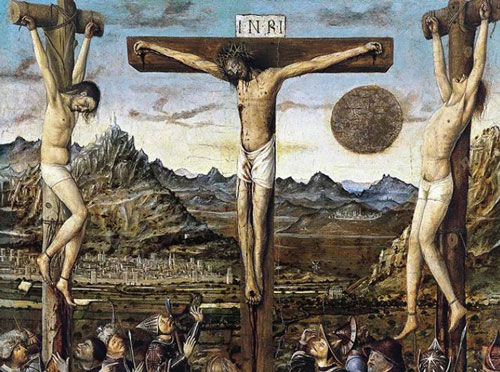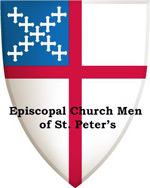I.Theme – Jesus – A real king – bringing God’s reign of justice and mercy to earth
![]()

The lectionary readings are here or individually:
Old Testament – Jeremiah 23:1-6
Psalm – Psalm 46
Epistle –Colossians 1:11-20
Gospel – Luke 23:33-43
This is a transitional Sunday. Christ the King Sunday signals the end of Ordinary Time and the end of our use of the Year C readings.
The end of year readings are partially about kingship – good kings, bad kings and our treatment of them. Jeremiah provides an analysis of bad kings – blamed for scattering the sheep and being evil. This is not just one ruler but a trend.
A secondary theme is God’s role in all of this. God will make good kings again and restore the people’s relationship to the earth and to each other. The Psalm demonstrates God’s protection and like a King defense of the people. It is a praise psalm. While there will be troubles, dislocations and woundes, ultimately God will be bring peace end division.
All of this culminates in the Gospel reading. Jesus is God’s way of ruling in this world and in the world to come. His ruling was born out of struggle. We are there with him with criminals on either side of him.
Then we see Jesus exercising his dominion in the midst of mockery, coercion, and arrogance. His two "words" from the cross in Luke’s account enact his authority. The first (Luke 23:34) fits powerfully in the narrative: "Father, forgive them; for they do not know what they are doing!"
The second (Luke 23:43) anticipates Jesus’ authority as the Son of Man, conferring mercy on sinners in God’s ultimate judgment: "Truly I tell you, today you will be with me in Paradise." He is there meeting the needs of those around him.
Joining Jesus in paradise had nothing to do with dying. It had nothing to do with being raised from the dead. It had everything to do with seeing beyond the appearances to the truth, that God is victorious in the cross. It has everything to do with the thief’s realization that his own condemnation on the cross bore no relationship to his standing before God.
He asks neither to be rescued from this plight nor revenged for his suffering. Rather, he wants only to be remembered, to not be forgotten. And how does Jesus respond? He exceeds even the criminal’s wildest expectations, declaring that today, even now, he would enter with Jesus into paradise. In that moment, he became free.
The Gospel is the story of how Jesus the Messiah of God brought God’s reign of justice and mercy to earth, and Luke’s account presents the crucified Messiah enacting God’s reign, surrounded by mocking, brutal violence.
David Lose writes how Jesus became a real king. "What kind of king is this, who welcomes a criminal into his realm and promises relief and release amid obvious agony? It is a king who refuses to conform to the expectations of this world, who will be governed neither by its limited vision of worthiness nor its truncated understanding of justice. It is a king who is not content to rule from afar, but rather comes to meet us in our weakness and need. It is a king willing to embrace all, forgive all, redeem all, because that is his deepest and truest nature. It is, finally, our king, come to usher us into his kingdom even as he implores us to recognize and make more manifest that kingdom already around us.
II. Summary
Old Testament – Jeremiah 23:1-6
In Chapters 21-22, Jeremiah has made prophecies about four of the five last kings of Judah. Three of these he considers bad, for siding with foreigners.
Rather than predicting the fate of the last one, Zedekiah, God now speaks (through Jeremiah) about an ideal future king. God blames Judah’s kings (“shepherds”) for scattering his “sheep”; they will be punished “for your evil doings” (v. 2). But God will bring the people together again, to perfect safety, and will set good kings (“shepherds”, v. 4) over them. Their state will be as God originally intended: in the first creation story, God commanded humans to “be fruitful and multiply” (v. 3). God makes a formal pronouncement (“the days are surely coming”, v. 5) when God will “raise up” a godly “Branch” (shoot, descendant) of David’s line who will be wise, just and godly, ruling over both “Judah” (v. 6) and “Israel”. (Zedekiah is alluded to in a wordplay, the Hebrew for “righteousness” being tzidkenu.) Later prophets, in dark times of unfaithful kings, recalled this ideal rule and promised its realization in the future. This led to expecting a new era, when God would himself rule the faithful.
Psalm – Psalm 46
This psalm tells of God’s protection and defense of his people. Perhaps the psalmist thinks of Isaiah 8:6-7; there “streams” (v. 4) are what God provides to the godly. The “city of God” is Jerusalem, God’s dwelling place on earth. Even if natural disasters (earthquakes, vv. 2-3) or political turmoil (v. 6) occur, or earth returns to its primordial chaotic state (“waters”, v. 3), God will remain (“not be moved”, v. 5), answering night-long prayer in the “morning”. Israel has suffered “desolations” (v. 8) for not doing God’s will. In a liturgy, a priest or prophet invites participants to consider God’s deeds: he ends political turmoil, bringing peace (v. 9). Recognize that God is supreme over all the earth! (v. 10) He is with his people and keeps them safe (v. 11).
Epistle – Colossians 1:11-20
The author has heard of the trust in Christ his readers have because of their hope of eternal life. “This hope … is bearing fruit and growing … from the day you … truly comprehended the grace of God” (his freely given gift of love expressed in Christ, vv. 5-6). So he prays for them that they may experience God’s ways to the full, leading the ethical lives God expects, and growing in knowledge of him (v. 10). Faced with deviant teaching, may God make them “strong” (v. 11) and “prepared to endure everything”. God (in Christ) has “rescued us” (v. 13) from the power of evil (“darkness”) and moved us to Christ’s realm, enabling us to share with others in the “inheritance” (v. 12, in being God’s children).
Vv. 15-20 is a hymn about Christ (“He”); he is how we see (and access) God (“image”). Angelology was popular at the time; “thrones …” (v. 16) were orders of angels; each was “created”, had its origin “in him”, and exists “for him”; any power they have is subordinate to Christ’s. The whole of creation, both heavenly and earthly, were created “through him” (v. 16), with his participation. He is the “firstborn” (v. 18), the inheritor from the Father, of created-ness; he governs it and is the cohesive power of the universe (v. 17). He existed “before all things”, before the first creative act. Greeks saw the “head” (v. 18) as the body’s source of life and growth. Christ is this to the Church, and “head” of it in the modern sense. He is “the beginning”, the nucleus of restoration of humanity to union with God, of the new created-ness. In his death (“blood of his cross”, v. 20), resurrection, and ascension to the Father, he is the forerunner (“firstborn”, v. 18) of our elevation to being with the Father, of our reconciliation with the Father (v. 20). Christians at Colossae tried to find ultimate power and truth in various deities, but in Christ all power and ultimate truth is present (v. 19).
Gospel – Luke 23:33-43
Jesus has been betrayed, arrested, mocked, beaten, and sentenced to death. He, Simon of Cyrene (carrying the crossbar), two criminals and a few police have walked to Calvary, “the place that is called The Skull” (v. 33).
Jesus continues his ministry of giving forgiveness to those who have not heard the Good News (v. 34). The division of his clothing fulfills the prophecy in Psalm 22:18; to be deprived of one’s clothing was to lose one’s identity. (Biblical examples are prisoners, slaves, prostitutes and damned people.)
The mob contemplates what is happening, but the “leaders” (v. 35) taunt Jesus: they blaspheme against God. In accord with Psalm 69:21, a psalm of the innocently suffering godly one, Jesus is offered “sour wine” (v. 36) – to revive him, and to prolong his ordeal.
Ironically, “Messiah of God, his chosen one” (v. 35) and “King of the Jews” (v. 38) are all true.
Three points emerge from this passage. First, we note the passage in general functions as a "last temptation of Christ. " Jesus refuses to subvert God’s plan by saving himself from a horrible death.
One might even say that the temptation here for Jesus to act in some way to "save himself" might even be stronger than it was in Luke 3. First, Luke skillfully uses language that puts Jesus’ trials here in a biblical context of unjust suffering. In v. 35 the high priests are said to "mock" him. A placard was placed around the criminal’s neck, bearing an “inscription” (v. 38) stating his crime.
Second, we see the recognition by the evildoer of Jesus’ kingdom. One criminal joins with the mob (v. 39) but the other responds positively to Jesus (vv. 40-41). For him there is salvation; Jesus pronounces him free of sin. Only a king can give pardon. (“Paradise”, v. 43, was the Jewish name for the temporary resting place of the godly dead.)
Third, we note the idea that today is the right time to respond to the claims of the kingdom on us.
David Lose writes "The kingdom of God (or of heaven, in Matthew) is not simply about supplanting an earthly ruler with a heavenly one. In heralding the coming kingdom of God, Jesus was not advocating regime change. Rather, Jesus was announcing the advent of an entirely different way of being in relationship with each other and with God. It’s not the ruler that changes, but the realm in which we live… But the kingdom — or, maybe better, realm — of God that Jesus proclaims represents a whole new reality where nothing is the same — not our relationships or rules, not our view of self or others, not our priorities or principles — nothing. Everything we thought we knew about kings and kingdoms, in fact, gets turned right on its head.
"Further, the realm of God over which Christ is king is not lurking somewhere "out there." It is already here among us, heralded by Christ’s preaching and made manifest in his death and resurrection. Yes, some future consummation may await us, yet the new realm is also already here, in our very midst. That means, of course, that we presently live in both realms, citizens of this world and citizens of the kingdom Jesus inaugurated.
" No longer can we keep our faith a private affair and ignore the need of our neighbor. No longer can we sing robust and rousing hymns about God’s glory and majesty and ignore the plight of God’s good earth. No longer can we pray that God’s kingdom come and yet manage our wealth as if it actually belonged — rather than was entrusted — to us. And no longer can we relegate the realm of God to a comfortably distant — or for that matter frighteningly near — future. The realm and rule of God is all around us, beckoning us to live by its vision and values even now.







